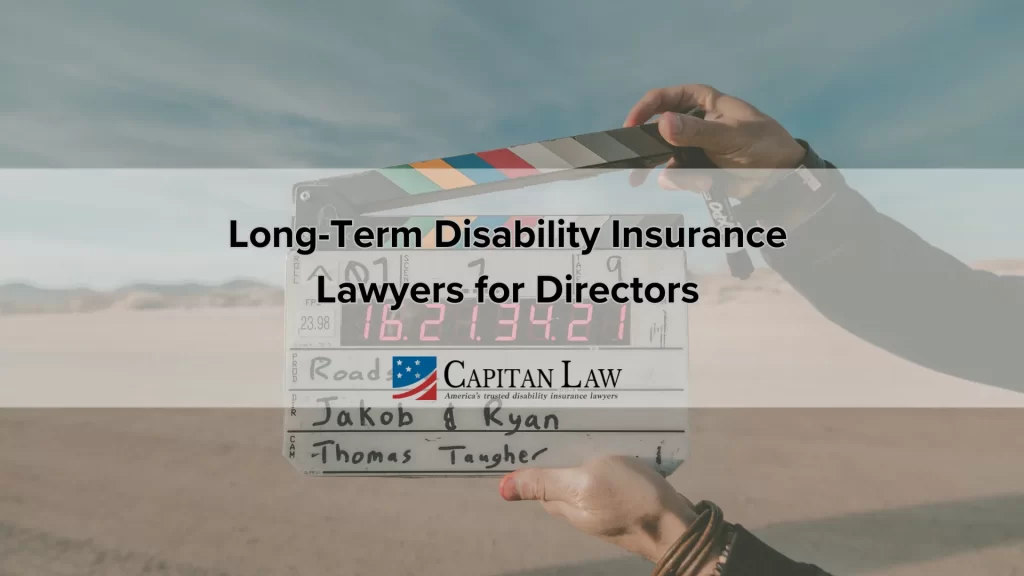
Long-Term Disability Insurance for Directors
The role of a director goes beyond charting a company’s path and leading teams. It’s about passion, commitment, and an unwavering drive to succeed. So, when a long-term disability casts a shadow over your professional life, you deserve a partner who truly understands what’s at stake for you and your business.
At Capitan Law, we’ve seen firsthand the impact a long-term disability can have on directors and the ripple effects for the organizations they steer. Our mission is to empathize, listen, and advocate fiercely on your behalf. With us, you’re not just another case; you’re a valued leader seeking justice. Call (267) 419-7888 today or complete our contact form for a free case evaluation.
What Is Long-Term Disability Insurance, and How Can it Help Directors?
At its core, long-term disability insurance ensures that you receive a portion of your income if you cannot work due to an illness, injury, or other debilitating condition for an extended period. It’s about more than just money. It’s about maintaining stability, dignity, and a semblance of normalcy during challenging times.
While different long-term disability insurance policies provide different coverage, most policies include the following benefits:
- Income Replacement: The primary benefit of long-term disability insurance policies is that they provide a percentage of your salary while you can’t work. This income allows you to pay your bills, mortgage, and day-to-day expenses.
- Extended Benefit Duration: Depending on your policy, benefits can extend for a few years, up to retirement age, or even for life. This extended duration offers peace of mind, as you know you have a safety net for the long haul.
- Protection from Inflation: With some policies, your benefit amount might increase over time to account for inflation, ensuring the support you receive stays relevant to your living costs.
- Waiver of Premium: If you become disabled and start receiving benefits, some policies may waive your premium payments. This means you won’t have to worry about paying for your policy while you cannot work.
Long-Term Disability Insurance vs. Workers’ Compensation
Long-term disability insurance and workers’ compensation both offer financial support when someone cannot work due to an injury or illness. However, they serve distinctly different purposes and circumstances. Long-term disability insurance provides a portion of an individual’s income when they cannot work. This is because of a medical condition, whether the onset of that condition is related to their job or not.
On the other hand, workers’ compensation is a state-mandated program specifically tailored to cover injuries or illnesses that occur as a direct result of a person’s job. If an individual gets hurt or falls ill because of a work-related incident or environment, workers’ compensation steps in. This will provide medical benefits and a portion of lost wages if the person can’t work. Unlike long-term disability insurance, which will pay benefits no matter what caused the disability, the focus here is strictly on work-related ailments.
 Common Reasons Directors Need Long-Term Disability Insurance
Common Reasons Directors Need Long-Term Disability Insurance
Like other people, directors can encounter a variety of health issues that could lead to long-term disability. Given their high-stress and often demanding roles, they might be particularly susceptible to certain conditions, such as:
- Cardiovascular Diseases: Given the intense pressure and responsibility on their shoulders, directors often have a heightened risk for heart-related problems, including heart attacks, high blood pressure, and strokes.
- Mental Health Disorders: The weight of making pivotal decisions and overseeing vast teams can take a toll on a person’s mental health. Conditions like depression, anxiety disorders, and burnout syndrome are common among directors.
- Musculoskeletal Disorders: Extended hours at the desk, frequent traveling, or even an unexpected accident can lead to conditions like chronic back pain, herniated discs, or repetitive strain injuries.
- Neurological Disorders: Directors are not immune to multiple sclerosis, Parkinson’s disease, or other neurodegenerative disorders that can inhibit their ability to function at their peak.
- Cancer: With advancing age and exposure to various environmental factors, the risk of developing different types of cancer increases.
- Chronic Respiratory Diseases: Conditions like asthma, chronic obstructive pulmonary disease (COPD), or other respiratory ailments can impact a director’s ability to maintain a consistent work schedule.
- Digestive System Disorders: Gastrointestinal issues, ulcers, or chronic liver diseases, often exacerbated by stress or irregular eating habits, can become debilitating over time.
- Sensory Impairments: Vision or hearing loss can significantly impact a director’s ability to perform their duties effectively, especially if these changes are sudden or severe.
Common Legal Issues with Long-Term Disability Claims
When directors file for long-term disability benefits, they can face myriad legal challenges that might hinder their claim’s approval. Given their unique employment status and often high incomes, their situations can be particularly intricate. Some common legal issues directors might encounter include:
- Income Calculation Complexities: Given that a director’s compensation might include bonuses, stock options, and other variable components, insurance companies may challenge or misunderstand the accurate determination of the “pre-disability” income, potentially affecting the benefit payout.
- Definition of “Own Occupation”: Many long-term disability policies distinguish between the inability to perform one’s “own occupation” versus “any occupation.” Given the specialized nature of a director’s role, insurers might argue that while a director might not be able to fulfill their specific duties, they could work in another capacity. This contention can affect eligibility.
- Exclusions and Limitations: Policies might contain exclusions related to pre-existing conditions. They can also set limits on benefits for specific diseases, especially mental health disorders. This can be a significant hurdle given the high stress of directorial roles.
- Surveillance and Investigation: Due to the typically larger payouts associated with director-level claims, insurers might subject claimants to rigorous scrutiny. This can include surveillance, deep dives into medical histories, or repeated requests for updated medical documentation.
- Duration of Disability: Insurers might challenge the length or severity of the disability, pressing for evidence that the condition is actually a long-term disability and not a temporary setback.
Need Help with a Long-Term Disability Claim? We Can Help
Long-term disability claims are our sole focus at Capitan Law, which gives us unmatched insight and experience with this complex area of the law. No matter your occupation, we can protect your rights and help you recover the benefits your policy promised. With offices in Pennsylvania and Kentucky, we proudly serve residents in those states and New Jersey. Call (267) 419-7888 today or reach out online for a complimentary case review.
Related Posts:
 Common Reasons Directors Need Long-Term Disability Insurance
Common Reasons Directors Need Long-Term Disability Insurance